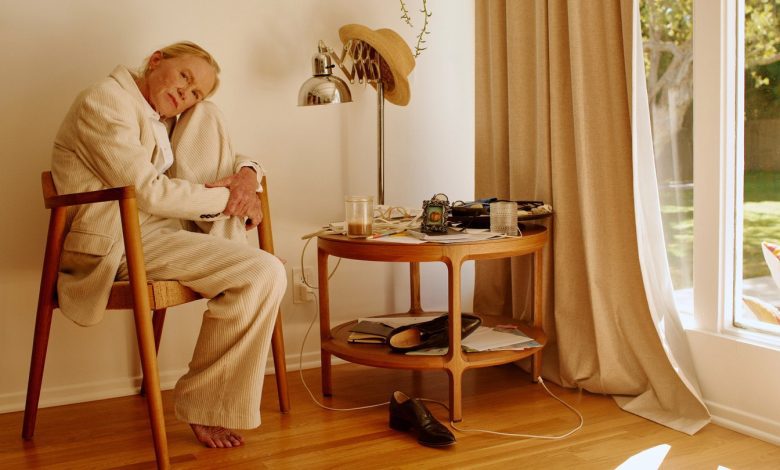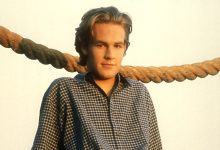Amy Madigan Is Back in the Spotlight. It’s Making Her Nervous

A woman is sitting alone in the back of a sleepy Malibu café. She’s in her mid-70s, with striking blond hair running just past her shoulders, wearing a long-sleeved black crew neck. She has newspaper pages splayed across her table, reading keenly between sips of coffee. The clanging of dirty dishes being gathered in the back kitchen does not bother her. The scene feels routine, set by a regular who prefers a late-afternoon arrival to enjoy the peace of a restaurant resetting itself between prime mealtimes.
I walk past the woman to set up at a nearby table, in prep for an interview with the actress Amy Madigan. Before I can sit, my phone buzzes with a text from an unfamiliar local number: “I’m sitting inside.” I turn around. The woman is still reading, still undisturbed. But it has to be her. “Amy?” I ask as I backtrack toward her. She smiles warmly. She got here early.
Madigan has a history of hiding in plain sight. While a whole generation of moviegoers may have only just discovered this, the veteran character actress has made her name, again and again, as a true chameleon. I genuinely didn’t recognize Madigan in Weapons, the smash-hit horror film that has thrust her back into the Hollywood spotlight after years of fighting for even small roles, until her name popped up in the end credits. At that moment, I yelped with delight. Such is the Amy Madigan effect: It might take a minute to recognize her — but once you do, her imprint is unmistakable and unforgettable.
In Weapons, 17 third-grade children go missing in a small Pennsylvania town at the exact same time. The film’s final act reveals that one of their classmate’s supposed aunts, Gladys (played by Madigan), is actually a witch and behind it all: She’s enchanted the kids into transferring their life force onto her, to keep her alive and kicking (or, I guess, killing) amid her deteriorating health. The movie, directed by Barbarian‘s Zach Cregger, has grossed $268 million worldwide since its August release. Madigan’s unhinged creation — her smeared clown-like makeup, her forehead-exposing auburn wig, her spunkily menacing fast talk — has evolved into the year’s most unexpected social media icon. Last month, Reddit threads sprouted up, dedicated to assembling the perfect Gladys Halloween costume.
“I’ll call her every now and again, and I’ll be like, ‘Amy, are you aware of what’s going on?’ ” says Cregger. “She’s like, ‘No! Tell me.’ “
Madigan, 75, is not on social media, but Cregger and others send her the TikToks, the reels, the dances, the memes. “As you very well know, the gay community has really taken to Gladys,” she says to me with pride as I open my notebook. “That’s really great — especially in this framework of the demonization of anybody other than a cis person — for the trans community. I think they really appreciate Gladys’ drag and makeup and how confident she is. So that’s a really nice cherry on top of all this.”
And how to describe “all this”? Madigan seems bewildered by these past few months, and as she folds up her newspaper and puts it away, tells me that she’s nervous even about this conversation. She made her feature debut in 1982; four years later, she was nominated for an Oscar. She went on to play significant roles in everything from ’80s classics Field of Dreams and Uncle Buck to the 2000s HBO hit Carnivàle. Somewhere along the way, the offers dried up. “There was a long period of time where she really didn’t work at all, or very little,” actor Ed Harris, her husband of 42 years, tells me. “She was considering just stopping and giving up on it.”
“Let’s say I’d be in the airport and someone recognized me — they’d go, ‘Oh, are you still acting?’ or ‘So what are you doing? Did you give up acting?’ ” Madigan says. “Those kinds of questions, just straight out!” Her pitch spikes here, the first time I can spot Gladys’ glorious quirks in the Madigan before me — except they’re endearing, not terrifying.
When Weapons came along, it was, above all, Madigan’s first juicy part in years. “I was telling everybody, ‘Hey, I’m going to play this really wild lady,’ ” she says. “Then it came out, and it turned into something else. It feels very antithetical to the work that I do and how I live my life.”

Brunello Cucinelli jacket; Madigan’s own jewelry.
Photographed by Chantal Anderson
***
Madigan was born and raised on Chicago’s South Side. She grew up as a rabid sports fan and a budding cinephile. “The train tracks were right on the corner, and there was one movie theater here, one movie theater there — they were a mile apart, and my brother and I would go every week with a quarter,” she says. “We watched all the black-and-white movies on TV. I saw all these new art films when I was a kid.”
Still, she didn’t pursue that life initially. After attending college in Milwaukee, Madigan moved to Los Angeles in 1974. She did not want to be a “rock star,” as some accounts of her early to mid-20s have it, but her aspiration was to be an alternative musician. She performed “blue-eyed soul, but also esoteric performance-art kinds of things,” she says, alongside friends Fred Bliffert and Jesse Roe. She pushed boundaries: In 1978, she appeared in Playboy nude and covered in jelly to promote their band called Jelly. “One of our hits was, ‘Why not take it out on the children? They’re smaller and weaker than you,’ ” she says with a laugh. It’s unclear if she’s describing the song’s name or theme or both.
She soon made a “hard pivot” toward her great love: acting. She studied at the Lee Strasberg Institute and got enmeshed in Los Angeles’ then-exploding theater scene. She met Harris while they performed onstage together, their first of many collaborations.
Screen roles soon followed. Read reviews of Madigan’s work in the ’80s and ’90s, and the adjective that comes up most often is somewhere between “fierce” and “ferocious.” Still something of an unknown, she starred opposite the likes of Gene Hackman, Ann-Margret and Ellen Burstyn in 1985’s Twice in a Lifetime and blew the roof off the indie family drama as a rageful woman trapped in a bad marriage. She earned its only Oscar nomination, competing against Oprah Winfrey (The Color Purple) and the eventual winner, Anjelica Huston (Prizzi’s Honor).
“I went to Neiman Marcus in my beat-up car and bought a dress for myself. I didn’t have a stylist,” she says of her first red carpet Oscar experience. “They got me someone to come over and do hair and makeup, thank God. Ed and I got to dress up. It was fun, and it was nerve-racking.” The awards campaign machine has expanded exponentially since those days. “Did they even have an Academy nominee luncheon back then?” she asks me. They did, but it was only a few years old.

Brunello Cucinelli suit, shirt; Madigan’s own jewelry.
Photographed by Chantal Anderson
Madigan didn’t exactly skyrocket to stardom from there. She played the female leads opposite Kevin Costner and John Candy, respectively, in two 1989 favorites: Field of Dreams and Uncle Buck. She got along swimmingly with Costner on Dreams and found Buck an ideal vehicle for her penchant for physical comedy. In both movies, she played opposite a then-7-year-old Gaby Hoffmann in her first two film roles. “I loved Amy. I just remember her smile and that I loved when she was around,” Hoffmann tells me. “That’s not always true of every adult on a movie set — that they make you feel like that, that they put a smile on your face.”
Those movies are about as broad and mainstream as you’ll find in Madigan’s filmography, but even there her work is courageously, movingly odd. “She’s a chameleon with a very pure essence that is a constant throughout all of her [projects], which is what the best actors can do,” Cregger says. Adds Josh Brolin, Madigan’s Weapons co-star: “An interesting actor is an interesting actor — hedge your bets with someone you know is going to deliver. Amy has always delivered appropriately, sometimes in an understated way, and sometimes in extremis.”
Going into the ’90s, Madigan started making even bolder choices simply by taking on risky films. She starred opposite Tilda Swinton in 1996’s Female Perversions, a bracing feminist erotic drama that struggled to find funding and that its writer-director, Susan Streitfeld, had struggled to cast. “Every actress was horrified by what we were revealing about what we women do to ourselves,” Streitfeld told The New York Times in 1997. Not Madigan: “It didn’t feel like a risk to me,” she says now.
Nor did Roe v Wade, a lightning-rod of a project that premiered on NBC at the height of the resurgent pro-life movement of the late ’80s and early ’90s. During production, the 1989 telefilm (co-starring Madigan’s longtime friend Holly Hunter) filmed under secret titles so as to avoid protesters — and worse.
By the time of its launch, advertisers had largely pulled out of the broadcast, which wound up attracting about 17 million people. The film was radioactive, but Madigan, who won a Golden Globe for her steely turn as the novice lawyer who defended “Jane Roe,” was steadfast. “I was very, very proud to make that movie, but it was an intense experience just because of everything swirling around it,” she says. “That’s how scared all those [advertisers] were.” She pauses, sighs and calmly raises her voice: “Well, now they’re scared again.”

Brunello Cucinelli jacket, belt, jeans; stylist’s own tee; Madigan’s own boots, jewelry.
Photographed by Chantal Anderson
***
Madigan is a news junkie. She reads three newspapers in print a day: The New York Times, The Washington Post and, solely for its sports section, the Los Angeles Times. These days, she scans her local paper to feed her cross section of baseball fandom that would delight most followers of the sport. She’s a diehard for her hometown Chicago White Sox, “who we hope could have a good team at some point,” but she also roots for the Cubs, the Yankees and the Dodgers. Then: “I hate Boston, as we would, and I hate Houston because they’re cheaters.” Noted.
As for what she’s reading in the other papers: Recent political developments have put Madigan in an “insular” state of mind. “People have been bullied and they’ve been pushed into the corner and they are afraid,” she says of the period since Donald Trump’s return to the Oval Office. “Everybody is terrified and nobody speaks up.” She’s never been afraid to go against the grain: Along with Harris, she famously sat still as a stone at the 1999 Academy Awards while others stood and applauded when the Hollywood blacklist-fueling Elia Kazan received an honorary Oscar. She hasn’t changed since. Madigan points out one bit of news that hits a little closer to home, given the studio behind Weapons. “Now, what — Warner Bros. is just going to be sold now?” she says, referring to reports that it is exploring interest from the likes of Paramount Skydance and Netflix. “It’s awful. It’s like it’s three entities: You’re dealing with Elon Musk and Jeff Bezos and — well, somebody else.” She trails off. “Zuckerberg?” I ask. She nods with authority. “Zuckerberg! All those guys, man. They’re all just bending the knee.”
I’m learning it’s best to stay out of the way when Madigan gets on a roll. She says what’s on her mind; she’s funny, smart and direct — in a way that’s anathema to most of today’s actors minding their social media presence.
We move on to AI. “Listen, if they could get rid of actors, they would do it. And Tilly whatever the fuck her name is — I’m sorry, Tilly. But she’s not real, so I don’t have to apologize!” Madigan says of the controversial “AI actress” named Tilly Norwood. “That’s just going to keep coming and coming and coming. But Tilly can’t put makeup on me and do special effects and create something. They can’t come up with an original idea.”
I start thinking back to that word that kept coming up in my research of Madigan’s early screen work: ferocious. It’s equally evident in person, however many decades later — she expresses herself with a commanding, witty force. Her musings are also sadly relevant to why her career started slowing down. If Madigan established herself by making fearless choices in fearless projects, she had little room to maneuver once the industry stopped supporting that niche. American indies like Twice in a Lifetime and Female Perversions are in deep peril. Hollywood has become petrified of anything close to polemical.
Despite some promising gigs, Madigan couldn’t find her footing in the burgeoning world of prestige TV, either. “I understand that I’m not the leading lady — I’m a character actor, and I like doing things with my body,” she says. “Maybe that was confusing to people, or what they were looking for was not me. I don’t really exude ‘the city D.A.’ ”
She’s managed great work where she could find it. Madigan is terrific in a small role in Ben Affleck’s Gone Baby Gone, and Harris cast her as Peggy Guggenheim in his Oscar vehicle Pollock. “I had a lot of pressure on me, and I wasn’t always the most gracious director,” Harris says with a laugh. “She showed up on set one day, just appalled at how I was behaving. … But it turned out OK. She did a great job as Peggy.” Otherwise, forget offers — she was barely getting auditions. “That wasn’t really asked of me,” she says. “Maybe some of those [casting] people were like, ‘Wait, is she still doing this?’ ” Madigan admits to having some “depressive” days until recently. “It’s not a very nice business,” she says. “It’s not easy when you had more opportunities, and then they get less and less and less. … I used to be more confident when I was younger. I’m not as confident now.”
She told Harris at one point, “I feel like people have retired me.” He responded: “Just wait. Something is going to come your way that’s going to get you everything that you need.” He recalls to me now, “I was trying to be supportive of her and trying to be a friend, good husband, lover, et cetera.” But he was onto something.

Brunello Cucinelli suit, shirt; vintage Christian Louboutin brogues; Madigan’s own jewelry.
Photographed by Chantal Anderson
***
There was a lot of pressure on Cregger when it came to Weapons. His solo debut, Barbarian, made more than $45 million on a budget of less than $5 million, and now Warners was entrusting the actor turned director with a movie costing eight times that. Even in the script, Gladys was the key to bringing the whole strange mystery together: “If that character doesn’t work, this movie doesn’t work,” he says. Cregger wrote out a long list of potential names with his casting director; someone suggested Meryl Streep. “I was like, ‘She’s a wonderful actor, but that would dominate the movie.’ ”
When Cregger got to Madigan, it all clicked. He first saw her in Field of Dreams and stayed a fan ever since. “Whenever she was onscreen, I was kind of dazzled — and I never really got why she wasn’t all over the place,” Cregger says. “So when her name came up, there was no downside. I was like, ‘She can do it. She’s amazing. She just fits right in.’ ” They met at a Malibu café — no, not the same one Madigan invited me to — and bonded quickly. Months went by before she was cast. “Zach wasn’t sure if the powers that be wanted somebody with a bigger name,” Harris says. “Amy was really patient. She really wanted to play this character.”
Madigan finally secured the part. Then Cregger kind of left her alone, confident their dynamic would function best if he didn’t know too much about how she would approach Gladys. When she showed up for her first full camera test in makeup and wardrobe, “Dude, I was crying,” Cregger says. “I was honestly crying.” The first time Brolin saw her in character, he got emotional, too: “It reminded me of a time when actors truly experimented and went for it with no ego or cosmetic concerns. She is of that echelon.”

Brunello Cucinelli jacket; stylist’s own tee; Madigan’s own jewelry.
Photographed by Chantal Anderson
What’s perhaps most remarkable about Madigan’s tour de force in Weapons is that it’s utterly reflective of her earliest years in the industry, when she crafted singular characters in all kinds and scales of projects. She goes big and silly and scary and heartbreaking, all at once.
“It says everything about casting the right actors, actors who are going to fill roles interestingly no matter where they are on their personal trajectory,” says Brolin. Weapons serves as not just an overdue reminder, but a galvanizing reintroduction to a generational actor, wrongly cast aside — as still happens all too often to women in Hollywood, once they cross a certain age threshold. And Madigan’s embodiment of Gladys is not only vibrant, but popular. Cregger now says he’s even officially working on a Gladys prequel movie. Madigan tells me she’d be all in but, true to form, she’s reluctant to get too excited: “I’d love to live inside Zach’s brain again, but we’ll see if that happens.”

Madigan in Weapons.
Quantrell Colbert/Warner Bros.
She’s “shocked” by the love that’s swept the internet. “I’ve been doing this a long time and I am who I am now at this stage of my life,” she says. She’s learning to enjoy the ride and starting to hear about more exciting acting prospects to come. “She’s been offered a couple of things already that she’s said no [to], that she just didn’t want to do,” Harris says. “She has always been really selective, not that she’s had that much to choose from. I hope that she gets some great opportunities in the future.” Madigan sounds optimistic: “People have already reached out, like, ‘Here it is, we want you,’ in various forms. That’s different in a way that feels new.”
The same goes for the Oscar buzz around Madigan’s Weapons performance. As with Twice in a Lifetime, she could well be the sole representative for her movie — and she’s uneasy with how big it all feels. “You see how I look when I go out — I look how I look!” she says, cackling as she gestures to her makeup-free face. “I’ve got a little tinted sunblock on, and that’ll do it.” Indeed, despite the apparatus around Weapons, it’s not hard to imagine Madigan navigating her second Oscar go-round as she did her first. She arrived at the Weapons premiere without a cadre of representatives in tow (unusual) and brought a bag up to the stage when she was called with the rest of the cast (also unusual). She is freely herself, unfiltered and vulnerable even with a reporter she’s only known for a few hours.

Madigan (far right) with Weapons stars Austin Abrams, Benedict Wong, Julia Garner, Cary Christopher, Josh Brolin, Alden Ehrenreich and June Diane Raphael.
Gilbert Flores/Variety/Getty Images
Just down the road, she and Harris are leasing a temporary home. Madigan gets teary recalling how, in January, they lost their house in the Pacific Palisades fire. “We got burned out,” she says, choking up. “Excuse me. It’s still very close.” This followed decades of close calls. During the 1993 Topanga Canyon fire, neighbor Sean Penn lost his home, and Madigan remembers the harrowing evacuation with her then 9-year-old, Lily. “I got a lifeguard to drive us to the Pali High gym,” she says. “We survived a number of fires, but not this one.” But they remain resilient: They’re in the process of rebuilding on their old lot, which will take years. All told, they’ve lived in the area since 1981 and aren’t going anywhere.
It’s a decent metaphor for Madigan’s career — she never abandoned this industry, either. When we’re not talking through her “psychological ups and downs,” as she wryly puts it, we often circle back to a shared love of movies. That’s where Madigan has always found drive, passion and inspiration — even when the parts weren’t there.
She expresses an unabashed love for Paul Thomas Anderson, Ari Aster and Hamnet star Jessie Buckley. (“I don’t know her. I’ve just seen her work. She’s incredible. I saw her play Juliet when she was younger, and I was like, ‘Oh, wow, who is this?’ “) She fears big money and AI advancements further curbing the cinema she treasures most. She hopes to work with more female directors, having observed Maggie Gyllenhaal in total command in Greece while helming The Lost Daughter, in which Harris co-starred. (“You’re with her and you’re like, ‘God, do I know anything?’ … It’s very inspiring!”)
She also looks back in awe at having acted with the likes of James Earl Jones and Burt Lancaster in Field of Dreams. “I got to work with some really cool people — I hope that doesn’t change,” she says. “And maybe at some point, someone will say, ‘Oh yeah, I got to work with Amy Madigan.’ “
This story appeared in the Nov. 5 issue of The Hollywood Reporter magazine. Click here to subscribe.
HiCelebNews online magazine publishes interesting content every day in the movies section of the entertainment category. Follow us to read the latest news.





